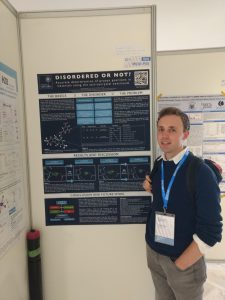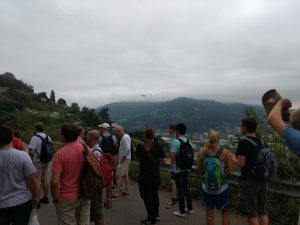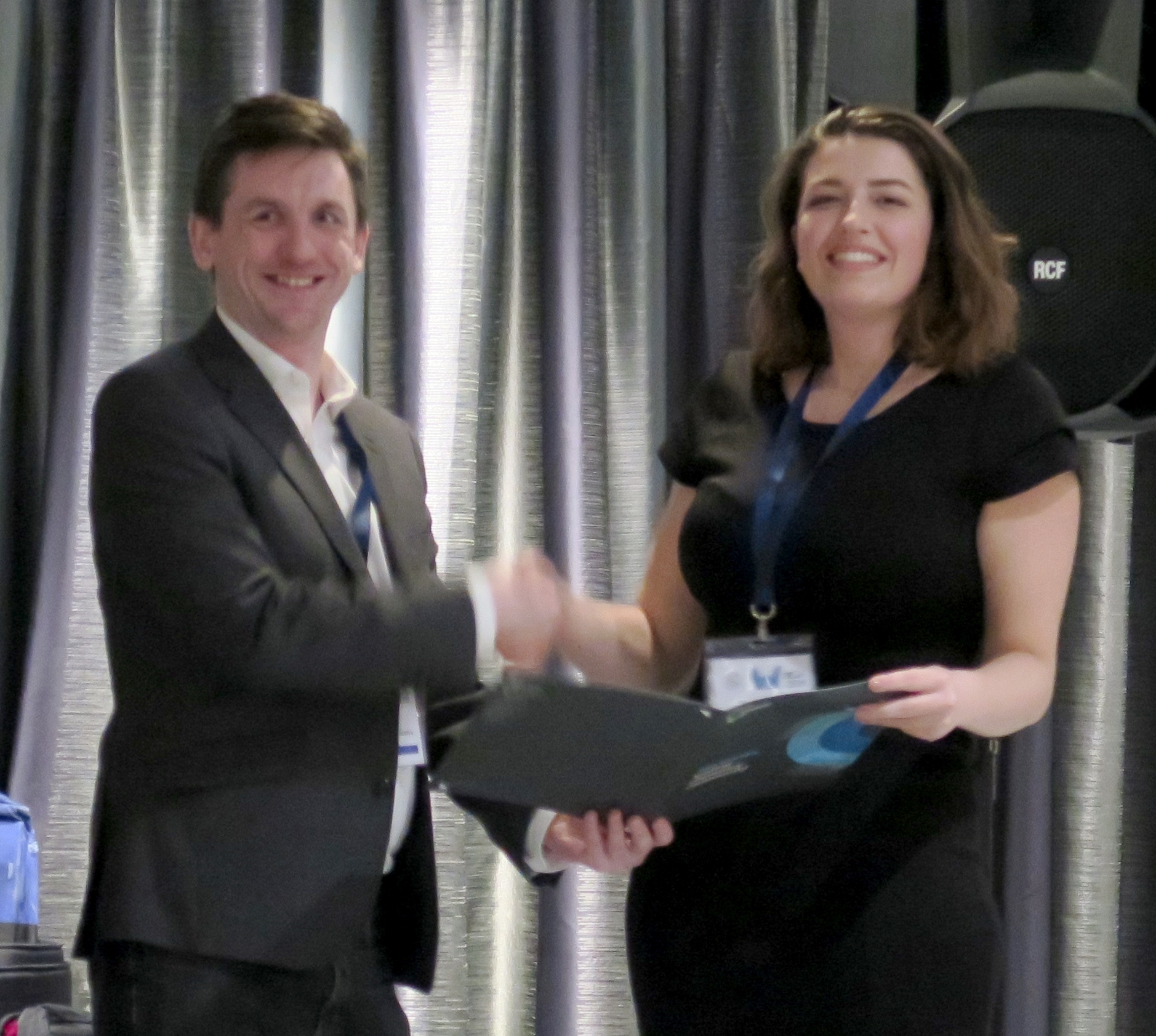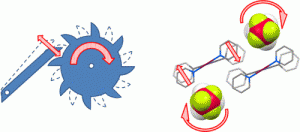
Georgia is investigating the occurence of modulation and the effects of radiation damage in a series of analogues of Barluenga’s reagent.

Georgia is investigating the occurence of modulation and the effects of radiation damage in a series of analogues of Barluenga’s reagent.
Chemical Communications 2018, 54, 9849 – 9852 [doi:10.1039/C8CC05430D]
For the collidine analogues of Barluenga’s Reagent (IPy2BF4) reported, a flat cation is necessary for the generation of a modulated phase, in keeping with the “Ratchet Model” theory [Kim et al., Crystal Growth & Design, 2014, 14, 6294]. Attempts to study “diffuse modulation” in Br(Coll)2ClO4 have shown that these non-Bragg features disappear very rapidly on exposure to synchrotron radiation, an effect thought to be caused by the radiation damage disrupting the lattice vibrations that cause the modulation.
The 31st European Crystallography Meeting was held in Oviedo, Spain from 22-26 August 2018.
 During the meeting George Sackman presented a poster (MS10-P05) on recent neutron diffraction work with Richard Cooper and Alison Edwards: Disordered or not: A cautionary tale when inferring proton disorder solely from X-ray and computational data.
During the meeting George Sackman presented a poster (MS10-P05) on recent neutron diffraction work with Richard Cooper and Alison Edwards: Disordered or not: A cautionary tale when inferring proton disorder solely from X-ray and computational data.
Richard Cooper gave a presentation (GI-MS47-O5) in the Saturday afternoon session How to… take your next steps in crystallography, based on experience of a career which despite including several areas of science and organisations rarely strayed outside the OX postcode.
On Sunday afternoon Amber Thompson presented (MS27-O5) Adventures in modulation: derivatives of Barluenga’s reagent, including work from Lewis Morgan, Yejin Kim, Emma McKinley, Jack Blandy, Claire Murray and Kirsten Christensen, in the session Quasicrystals: theory and
experiment.

Prior to the meeting, Richard Cooper was a tutor at the ECA Crystallographic Computing School in Mieres, organised by the ECA SIG 9 and gave a lecture on Programming Crystallographic Symmetry.
 The 2018 Meeting of the British Crystallographic Association was held at Warwick University where Chem. Cryst. was well represented. The meeting started with the Young Crystallographers Satellite meeting, during which Lewis Morgan’s oral presentation was so “eggsellent” that he won the Industrial Group Prize for the best talk, and with it, the dubious honour of presenting it again as a plenary in the main meeting.
The 2018 Meeting of the British Crystallographic Association was held at Warwick University where Chem. Cryst. was well represented. The meeting started with the Young Crystallographers Satellite meeting, during which Lewis Morgan’s oral presentation was so “eggsellent” that he won the Industrial Group Prize for the best talk, and with it, the dubious honour of presenting it again as a plenary in the main meeting.
At the conference dinner Kiaora Tolmie received a CCG CrystEngComm poster prize for her poster on hard-to-crystallize materials, and James Bird was awarded the YCG I’m-a-scientist-get-me-out-of here prize for the poster presenter who most clearly and enthusiastically communicated their results.
Congratulations to all three winners!
A full list of the presentations from Chem. Cryst.:
George A. Sackman & Richard I. Cooper
Distinguishing Disorder: A Molecular Dynamics Approach (Poster Presentation)
Kiaora L. M. Tolmie & Richard I. Cooper
Structure Determination of Hard-to-Crystallize Materials (Poster Presentation)
Lewis C. F. Morgan, Jack N. Blandy, Claire A. Murray, Kirsten E. Christensen & Amber L. Thompson
Improving Our Understanding of Modulation in Molecular Materials (Poster & Oral Presentation)
James M. Bird & Richard I. Cooper
A Comparison of Molecular Dynamics Techniques for Simulation of Thermal Disorder in Molecular Crystals (Poster Presentation)
Oliver J. A. Bar & Richard I. Cooper
A Study of Phase Transitions in Organic and Metal-organic Inclusion Complexes through Molecular Dynamics Simulation (Poster Presentation)
Richard I. Cooper
CrysPy: CRYSTALS in Python (Poster Presentation)
Amber L. Thompson
When are Bad Data Good Data? (Keynote Oral Presentation)
Crystal Growth & Design (2014). 14 (12), 6294–6301. [ doi:10.1021/cg500983s ]
 Investigations into the phase transition of Barluenga’s reagent revealed a transient incommensurately modulated phase. To understand the origin of the modulated phase and the chemistry that can affect it, analogues of Barluenga’s reagent were synthesized and studied. In this context, the halogen and anion can easily be exchanged. Studying different analogues led to the development of the Ratchet Model to describe the behavior in the solid state leading to a better understanding of modulation in this class of molecular crystal structure.
Investigations into the phase transition of Barluenga’s reagent revealed a transient incommensurately modulated phase. To understand the origin of the modulated phase and the chemistry that can affect it, analogues of Barluenga’s reagent were synthesized and studied. In this context, the halogen and anion can easily be exchanged. Studying different analogues led to the development of the Ratchet Model to describe the behavior in the solid state leading to a better understanding of modulation in this class of molecular crystal structure.
Publisher’s copy
![]() The 21st International Conference on the Chemistry of the Organic Solid State was held from 5th-9th August 2013 at St Catherine’s College in Oxford. ICCOSS deals with various aspects of the crystalline state and reactivity of organic and hybrid materials from preparation to characterization. It includes the investigation of crystal structures and supramolecular architectures, crystal growth and design, inclusion compounds, topochemical reactions, nanostructures, heterogeneous interfaces.
The 21st International Conference on the Chemistry of the Organic Solid State was held from 5th-9th August 2013 at St Catherine’s College in Oxford. ICCOSS deals with various aspects of the crystalline state and reactivity of organic and hybrid materials from preparation to characterization. It includes the investigation of crystal structures and supramolecular architectures, crystal growth and design, inclusion compounds, topochemical reactions, nanostructures, heterogeneous interfaces.
Amber Thompson presented a talk entitled Modulated structures: a curiosity today, ubiquitous tomorrow? and Richard Cooper presented work carried out with Jerome Wicker: Will it Crystallize?
The third Red Kite Meeting was very well attended and comments from attendees indicated that it was very well received. As well as Richard Cooper chairing the first session, contributions from Chem. Cryst. included posters from Will Brennan, George Pidgeon, Olivia Shehata, Karim Sutton and Jerome Wicker and a presentation from Kirsten Christensen on modulated molecular materials. The esteemed poster judges picked George’s poster on hydrogen bonding in fluoride complexes as one of two joint prize-winning efforts thanks to the clarity of his presentation.
Summer is conference season and the members of Chem. Cryst. have been on the road to the ACA in Boston and the ECM in Bergen. In September, Kirsten will also be attending the 7th International Conference on Aperiodic Crystals, to be hosted in Cairns, Australia. Contributions include:
David J. Watkin, Richard I. Cooper & Anna Collins
Z’>1 Structures. Just a Nuisance or Something More Interesting? (ACA; Oral presentation)
Karim J. Sutton, Richard I. Cooper, Kirsten E. Christensen, Amber L. Thompson, David R. Allan & Sarah A. Barnett
Exploiting the Tunable Wavelength Capabilities of Synchrotron Radiation for Small Molecule Single Crystal X-ray Crystallography (ACA; Prize winning oral presentation)
Richard I. Cooper
CRYSTALS: Teaching an Old Dog New Tricks (ACA; Oral presentation)
Amber L. Thompson
When Small Molecules Get Large – A Journey into the Unknown (ECM; Oral presentation)
Anthony Linden & Amber L. Thompson
Hot topics and Structures in Molecular Chemistry (ECM; Microsymposium)
Kirsten E. Christensen & Amber L. Thompson
New Challenges in Chemical Crystallography (Aperiodic; Oral presentation)
The 2012 Meeting of the British Crystallographic Association was held at Warwick University. Oxford was very well represented this year with Kirsten Christensen chairing the Programme Committee and prizes being awarded to Joe Paddison, Nick Funnell and Emma McKinley.
Other contributions from Oxford include:
Karim J. Sutton, Kirsten E. Christensen, Amber L. Thompson & Richard I. Cooper
Exploiting the Tunable Wavelength Capabilities of I19 (Poster & Oral Presentation)
Callum A. Young & Andrew L. Goodwin
An Examination of the Low Temperature Structure of Fe3O4 Using Reverse Monte Carlo Refinements (Oral Presentation)
Andrew L. Goodwin
Frameworks, Flexibility and Frustration (Oral Presentation)
Kirsten E. Christensen, Amber L. Thompson & Arwen R Pearson
Discussion Forum:Â From Small Molecules to Proteins:Â Bridging the Gap
Emma J. McKinley, Kirsten E. Christensen & Amber L. Thompson
Investigation of the Transient Modulated Phase of Barluenga’s Reagent (Poster)
Andrew B. Cairns, Amber L. Thompson, Andrew L, Goodwin, Matthew G. Tucker & Julien Haines
Anomalous Compression of Cyanide Frameworks:Â Mechanisms for Extreme Negative Response (Poster)
Callum A. Young, Edward Dixon, Michael A. Hayward & Andrew L. Goodwin
Apical Oxygen Bonding in YBCO – A Reverse Monte Carlo Approach (Poster)
Ines E. Collings, Andrew B. Cairns, Amber L. Thompson, Andrew L, Goodwin, Philip Pattison, Julien Haines, Matthew G. Tucker, Julia E. Parker & Chiu C. Tang
Transferable Mechanics in Molecular Framework Materials (Poster)
Joseph A. M. Paddison, Andrew L. Goodwin, Ross Stewart, Pascal Manuel, Matthias J. Gutmann, David A. Keen, Matthew G. Tucker, Andrew Wildes & Brian Rainford
Frustration and Magnetic Diffuse Scattering in β-Mn0.8Co0.2 and MnO: A Reverse Monte Carlo Study (Poster)
Matthew Cliffe & Andrew L. Goodwin
Disorder and Defects in Zirconium MOFs (Poster)
Nicholas P. Funnell, Martin T. Dove Andrew L. Goodwin Simon Parsons & Matthew G. Tucker
How Molecules Prepare to Undergo a Transition:Â The Onset of Disorder in Solid Cyclohexane (Poster).